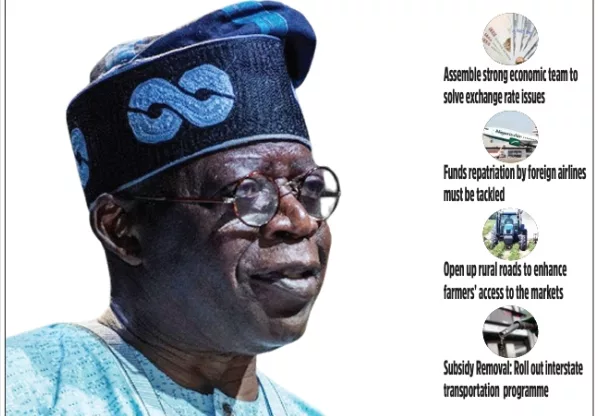During his initial 100 days in office, President Bola Ahmed Tinubu introduced a comprehensive set of policies aligned with his commitment to prioritise the well-being of Nigerians and address detrimental fiscal and monetary practices. Particularly, these policies target the reduction of burdensome taxation and the promotion of a market-oriented economy to enhance revenue generation for developmental initiatives.
While noteworthy progress has been made in terms of implementing reforms, certain key elements are conspicuously absent. These missing components primarily concern measures directly benefiting the populace and mitigating the adverse effects of fuel subsidy removal. Notably, the anticipated immediate rollout of palliative measures, as pledged by the government, is still awaited.
President Tinubu’s administration has made its economic policy direction explicit, focusing on fostering a favorable business environment, revenue enhancement, elimination of excessive taxation, monetary policy restructuring, ease of doing business, and overall economic growth, aiming to ensure prosperity for all citizens.
An early and significant decision made by President Tinubu was the removal of fuel subsidy on Premium Motor Spirit (PMS), commonly known as petrol, shortly after taking office. This move was met with public skepticism due to the resultant price hikes. The immediate consequence was a surge in petrol prices to N540 per liter as petroleum product marketers adjusted their rates. This abrupt change left motorists and commuters unprepared, leading to fewer transportation options for the general public.
President Tinubu defended the subsidy removal, emphasising the need to redirect funds from subsidies toward public infrastructure, education, healthcare, and job creation. However, the populace is still waiting for the promised improvements in their lives.
Economists and experts anticipate a temporary inflationary impact resulting from the fuel subsidy removal. To counteract such effects, experts recommend adopting macro-fiscal policies that ensure price stability. The Nigeria Development Update (NDU) emphasised the importance of providing compensatory measures to shield households from the initial price shocks caused by the subsidy reform.
To achieve this, they argued, government needs to not only offer immediate cash compensation but also create a comprehensive plan to utilise the freed-up resources for the benefit of Nigerian citizens.
According to them, the National Economic Council’s proposal to mitigate the subsidy removal’s impact should clearly outline areas for government investment and involve the public in decision-making processes, adding that the compact formed in this manner should prioritise development, pro-poor services, social protection programs, and maintain fiscal realism to avoid excessive deficits.
Recent executive orders signed by President Tinubu signify a commitment to align fiscal policies with the interests of Nigerians and to eliminate business-unfriendly tax policies. These orders aim to defer the implementation of tax changes, suspend certain excise taxes, and introduce measures to enhance the business environment.
Furthermore, a Presidential Committee on Fiscal Policy and Tax Reforms was established to address barriers hindering business growth, particularly the issue of multiple taxation. Chaired by an expert from Price Waterhouse Coopers (PwC), the committee will consist of professionals from both the private and public sectors. The committee’s goal is to drive comprehensive fiscal policy and tax reform that will enhance revenue collection efficiency, ensure transparency, and promote voluntary compliance.
Though President Tinubu’s economic policies have garnered praise from experts, there is a shared hope among Nigerians for a significant and positive economic turnaround. Citizens anticipate that these policies will improve living standards, foster inclusive growth, and reduce economic challenges. However, a swelling number of Nigerians who have been hit hard by the abrupt removals of fuel and exchange rate subsidies demonstrated palpable dissatisfaction over the federal government’s move. The World Bank has predicted 7 million Nigerians falling into poverty as a direct impact of subsidy removal.
Last week, Edo State governor, Mr. Godwin Obaseki, said the federal government’s fuel subsidy removal policy has further improvised Nigerians and inflicted hardship and suffering on the people.
Obaseki, who stated this in Benin City, said he was also shocked about the government’s inability to plan and effectively respond to the fuel subsidy removal.
The governor said he had raised the alarm following the mismanagement of the nation’s economy, noting that the country’s situation is taking a turn for the worse as a result of bad policies by the government at the center.
Dr. Paul Ibe, an economist agreed. He told NATIONAL ECONOMY that while the subsidy removal was inevitable considering the bleeding of the economy, President Tinubu was too hasty to pronounce the removal. He contended that the president should have put some palliative in place to assuage the pains emanating from the subsidy removal on the masses.
He noted that Nigeria is a country characterised by low productivity and is heavily import-dependent. He said without adequate production of goods and services for local consumption and export, Nigeria cannot earn enough foreign exchange to defend the naira. Hence, the naira will continue to be under pressure and lose value to international currencies.
According to Ibe, “Sudden and complete removal of subsidies can lead to price shocks and public outcry. A gradual phasing-out approach allows consumers and industries to adjust over time. This can involve reducing the subsidy amount progressively over a set period.
“To mitigate the impact on vulnerable populations, such as low-income individuals, the government can consider implementing targeted assistance programs. This might involve direct cash transfers, food assistance, or other forms of social support.”
Another economist, Zakari Mohammed, noted that proper communication about the reasons for subsidy removal, its benefits, and the potential short-term challenges can help manage public expectations and reduce resistance.
He advocated the implementation of mechanisms that prevent sudden price spikes such as a price ceiling or floor that can be set to prevent prices from rising or falling beyond a certain range. Pertaining to the exchange rate subsidy, Mohamed said if the government does not intervene to defend the naira, it may be exchanged for N1,000/$ before the end of 2023.
An economics lecturer at the University of Lagos, Babatope Ogunniyi, urged the government to roll out interstate transportation system in order to cushion the impact of subsidy removal.
According to the executive vice chairman of Highcap Securities Limited, David Adonri, major issues confronting the financial sector include multiple exchange rates, foreign exchange scarcity and trapped foreign investor’s funds, naira scarcity, excessive public borrowing and debt burden, excessive tax on investment and inactivity of the equities primary market.
He said by unifying the exchange rates, the policy can reduce currency speculation, curb capital flight, and attract foreign investment.This stability he maintained, will provide a solid foundation for economic growth and development.
On his part, economic affairs analyst, and CEO of Cashlinks Ltd., Livinus Azosiwe, stated that if the subsidy removal affects a critical sector (such as energy), the government can use the saved funds to invest in alternative infrastructure, technologies, or industries that can provide more sustainable solutions.
He added that a broader economic diversification strategy can help reduce the reliance on a single sector that might be heavily impacted by subsidy removal.
“Ensure that the funds saved from subsidy removal are used for their intended purposes, such as investing in public services, infrastructure, or social programs. This requires transparent budgeting and accountability mechanisms.
“Involve various stakeholders, including industries, labor unions, and civil society, in the decision-making process. Their insights can help shape a more balanced approach,” he added.
Former financial secretary of the National Union of Air Transport Employees (NUATE), Fatai Afolabi argued that the issue of funds repatriation by foreign airlines must be tackled as this will lead to a drastic control of the rising cost of airfares witnessed since this year.
Former United Nations consultant to the Food Crop Production Transfer Station, Ubiaja, and National Horticulture Research Institute (NIHORT) Ibadan Ikechi Agbugba said the new administration should open up rural roads to enhance farmers’ access to the markets.
Agbugba wants the president to direct all state governors to revitalise their agricultural development programmes.





